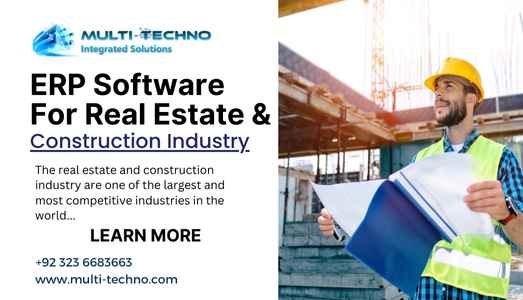Multi-Techno Integrated Solution

Table of Contents
ToggleERP Software for Real Estate & Construction Industry
The ERP Software for Property and Building Sector, real estate and construction industry are one of the largest and most competitive industries in the world. It requires seamless coordination between multiple departments and stakeholders to ensure the successful completion of projects. The traditional manual methods of managing projects have become insufficient and time-consuming, and that’s why many companies are now turning to ERP (Enterprise Resource Planning) software.
An ERP Software for Property and Building Sector helps organizations streamline their processes, reduce manual workloads, and increase efficiency. In the real estate and construction industry, an ERP system is essential to manage everything from project planning to construction, finance, and property management. In this article, we will explore how an ERP solution can benefit the real estate and construction industry and what to look for when choosing ERP software.
Advantages of ERP Software for Property Development & Building
Optimized Project Oversight:
ERP Software Furnishes Real-time Insights into project status, resource allocation, and scheduling logistics. These insights serve as linchpins for monitoring project progression, preempting potential pitfalls, and fostering data-driven decision-making. Furthermore, an ERP infrastructure facilitates cross-functional collaboration, fostering synergy between departments such as construction and finance to ensure adherence to budgetary constraints and temporal necessities.
Augmented Operational Efficiency:
ERP software curtails manual workloads and amplifies operational efficiency by automating sundry business processes encompassing invoicing, procurement, and inventory management. This allows enterprises to channel their resources towards core business pursuits whilst minimizing error margins. Additionally, real-time visibility into resource availability enables organizations to allocate resources, culminating judiciously in optimal resource utilization.
Enhanced Financial Oversight:
An ERP infrastructure furnishes real-time financial insights, encompassing account payables, receivables, and liquidity dynamics. This trove of information serves as a cornerstone for expense tracking and informed financial management initiatives. Furthermore, ERP systems seamlessly integrate with accounting software suites like QuickBooks, facilitating a holistic comprehension of the organization’s financial milieu.
Elevated Customer Relationship Management:
ERP software furnishes a centralized repository housing comprehensive customer data, spanning contact details, historical transactional insights, and interaction logs. This reservoir of information facilitates astute customer relationship management endeavors, augmenting the efficacy of customer service initiatives. Moreover, ERP systems seamlessly interface with CRM (Customer Relationship Management) platforms, amplifying visibility into customer interactions and fortifying sales and marketing endeavors.
Streamlined Asset Administration:
An ERP infrastructure offers real-time insights into property availability, rental dynamics, and maintenance requisites. This data repository is a linchpin for efficacious asset administration, empowering stakeholders with the requisite insights to streamline property management endeavors. Moreover, ERP systems integrate seamlessly with property management software suites, furnishing stakeholders with a comprehensive purview of property-related information whilst automating ancillary property management tasks.
Key Considerations in ERP Software Selection for Property Development & Building
Interoperability:
An ERP solution must seamlessly integrate with extant software suites like accounting and project management platforms. This interoperability fosters real-time data exchange and furnishes stakeholders with an all-encompassing perspective of organizational operations.
Tailorability:
An ERP system must exhibit adaptability to accommodate the idiosyncratic exigencies prevalent within the property development and building domain. This customization spectrum spans the gamut from incorporating novel modules like property management to tailoring existing modules such as project oversight functionalities.
Intuitive User Interface:
The user interface of an ERP system must embody user-friendliness, facilitating seamless navigation and operation. This mitigates the learning curve for personnel whilst enhancing operational throughput. Additionally, real-time data dissemination and dashboard functionalities empower users with actionable insights.
Mobile Accessibility:
Ubiquitous access to real-time data is imperative in the contemporary business milieu characterized by relentless dynamism. Ergo, an ERP system must proffer mobile accessibility, enabling stakeholders to glean insights from their handheld devices irrespective of geographic constraints.
Scalability:
An ERP solution must exhibit scalability to accommodate an organization’s evolving needs. This scalability paradigm encompasses the seamless integration of novel modules, incorporating emergent software solutions, and onboarding additional users.
Technical Support:
Given the pivotal role that an ERP infrastructure assumes within organizational workflows, robust technical support mechanisms are indispensable. ERP software vendors must proffer round-the-clock technical assistance to address potential difficulties swiftly.
Cost-Efficiency:
An ERP system must epitomize cost-efficiency whilst delivering a discernible return on investment. Flexibility in pricing models, including providing cloud-based solutions, augments the cost-effectiveness quotient vis-a-vis on-premises alternatives.
Conclusion of ERP Software for Property and Building Sector
An ERP software solution constitutes a sine qua non for enterprises operating within the purview of property development and building, facilitating efficacious management of organizational operations. The salient advantages encompass refined project oversight, heightened operational efficiency, astute financial management, augmented customer relationship management, and streamlined asset administration. Ergo, Conscientious Consideration of the selection above criteria is imperative in ensuring the prudent adoption of ERP software within the property development and building sector.
About Us
ERP software and systems are designed and implemented by Multi-Techno, a registered company. By combining data from financials, sales, CRM, inventories, and operations, businesses can increase productivity, make better decisions, and increase profitability with the aid of our ERP System, a single, integrated software platform.
Quick Links
Contact Us
Office # 100, 101 Second Floor Kohinoor 1, Faisalabad, Pakistan
